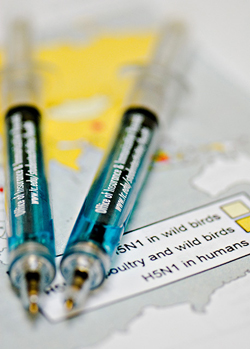What to Do About the Avian Flu
Since May, a working group representing 14 academic and administrative areas of the College has been updating the College's Disaster Response and Business Continuity Plan to include the threat of pandemic flu.
"Currently, there is concern about one strain of avian influenza, also known as the bird flu, because it is causing severe disease in wild birds, chickens and other poultry in several continents," says Jim Mitchell, Director of Residential Services and Campus Safety, who is heading up the Pandemic Preparedness Work Group. People who have had close contact with sick poultry have, in some instances, become infected and have died-'"since 2003, there have been 256 human cases of H5N1 worldwide that led to 151 deaths-'"and there is concern that the disease, also known as H5N1, will mutate into a form that is more easily spread from birds to humans and, ultimately, from human to human.
The working group has been meeting since June and is on course to provide a draft to the senior staff for review by the end of this semester. The Pandemic Preparedness Plan will be coordinated with the College's existing emergency response plans and will include a response for three levels of a potential pandemic. Level one will address human-to-human transmission outside of
The College hopes to have a finalized plan by January and thereafter, the work group will meet periodically to test the plan and keep it current.
"The College has a responsibility to maintain our business operations and the safety and health of students on campus," Mitchell says. "Everyone is encouraged to speak with their physician about an annual flu shot. While the flu shot will not protect you from the Avian Flu, it will help keep you healthy."
TC's Office of Human Resources offered free flu shots to staff this November. For more detailed information on individual and family flu planning, visit: www.pandemicflu.gov/plan/tab3.html.
Published Wednesday, Dec. 13, 2006
